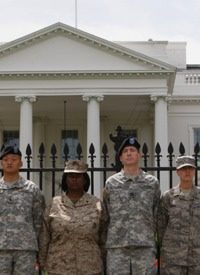
After congressional efforts to repeal the military’s long-standing policy of “Don’t ask, don’t tell” have failed to clear Congress, a federal court has issued an injunction to suspend the policy. According to Judge Virginia Phillips of Federal District Court for the Central District of California, the policy “infringes the fundamental rights of United States service members and prospective service members.”
Additionally, Judge Phillips asserts that “Don’t ask, don’t tell” violates due process and freedom of speech of homosexual military men and women.
According to All Headline News, “The permanent injunction granted by Phillips prohibits the government from enforcing or applying the ‘Don’t Ask, Don’t Tell’ Act and implementing regulations, against any person under their jurisdiction or command.”
Indian Express writes, “Judge Phillips issued an injunction ‘to suspend and discontinue’ immediately any investigations or proceedings to dismiss members of the armed services.”
Judge Phillips’ injunction comes on the heels of her decision in Log Cabin Republicans v. United States of America, which declared the “Don’t ask, don’t tell” policy to be “unconstitutional.” In that case, the Log Cabin Republicans challenged the military policy on two accounts: alleging it violates right to due process as it is guaranteed in the Fifth Amendment, and asserting that it bans “freedom of speech, association, and [the right] to petition the government, guaranteed by the First Amendment.”
The suit, filed by the Log Cabin Republicans in 2004, was the only one to challenge the policy, which has been called “discriminatory” by the Obama administration.
In Phillips’ 85-page ruling, she wrote: “The act discriminates based on the content of the speech being regulated. It distinguishes between speech regarding sexual orientation, and inevitably, family relationships and daily activities, by and about gay and lesbian service members which is banned, and speech on those subjects by and about heterosexual service members, which is permitted.”
Following Phillips’ ruling, CNN reported, “The next step is expected to be for the government to ask for a temporary injunction to prevent the ruling from going into immediate effect, pending further appeals. The government at some point in the next few weeks or months would then file a petition with the 9th Circuit U.S. Court of Appeals, which is based in San Francisco, for a hearing. If the government were to lose, its next step would be to the Supreme Court.”
Indian Express believes that the ruling in Log Cabin Republicans v. United State of America is likely to be appealed, since the federal government has up to 60 days to file an appeal after the decision, which was made on September 9.
While the Justice Department has not yet issued a statement, it did file objections last month to Phillips’ ruling: “The government should be afforded a reasonable amount of time to consider the terms of the injunction and to move for an appropriate stay before an injunction is made effective. A court should not compel the Executive to implement an immediate cessation of the 17-year-old policy without regard for any effect such an abrupt change might have on the military’s operations, particularly at a time when the military is engaged in combat operations.”
All Headline News explains, “The [Obama] administration is seeking a repeal of the law but is duty-bound to defend it in courts.” However, the White House has agreed to support Democratic lawmakers wishing to begin the process of repealing the military policy, after the completion of the Pentagon review.
In response to the injunction, Log Cabin Republicans Director Christian Berle said, “Lifting the ban on open service will allow our armed forces to recruit the best and brightest and not have their hands tied because of an individual’s sexual orientation.”
Similarly, President Obama and Defense Secretary Robert Gates applauded the court’s ruling, after having spoken out against the ban on openly gay military personnel on numerous occasions.
However, not everyone sees the injunction or decision as a happy ending.
Tony Perkins, president of the Family Research Council, accused Judge Phillips of “playing politics with our national defense.”
Charles Rice, professor emeritus at the University of Notre Dame law school, responded to the judge’s decision, calling it “an example of tyranny of the judiciary.” “The very idea that the policy of ‘Don’t ask, don’t tell’ is unconstitutional is absurd,” he contended. The decision “highlights the situation of the ruling class in which we find ourselves …. We have to use the electoral process to overturn the ruling class.”
The military defense policy bill failed to pass a procedural vote in the Senate at the end of September because of Democratic Senator Roland Burris’ inclusion of a controversial repeal of the “Don’t ask, don’t tell” policy.
Fox News reported that the failed military policy defense bill vote “makes it all the less likely that Congress will take any substantive action on ‘Don’t Ask, Don’t Tell’ … before adjourning for the November midterm elections.”
Military officials, who urged Congress to suspend efforts to repeal the policy until after an internal Pentagon review on the topic was completed, were comforted by the failed defense policy bill vote. The review, conducted by the Pentagon’s top lawyer and General Carter Ham, is set to be completed in December.
Unfortunately, Judge Phillips’ injunction highlights the notion of judicial overreach with which Americans have been confronted, and serves as another illustration of Congress’ diminishing role.
Photo of homosexual service members in front of the White House: AP Images




